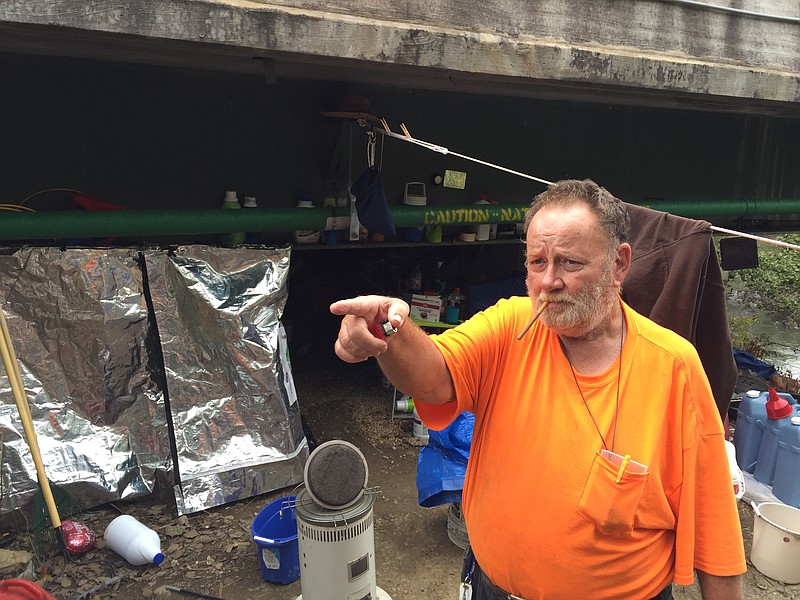RINGGOLD, Ga. - The Ringgold City Council will not kick out the homeless people from under a local bridge at least until mid-November.
The elected officials voted to wait until after a Nov. 15 forum on the issue at Ringgold First Baptist Church. A group of North Georgia pastors have invited stakeholders to meet at 3 p.m. and discuss solutions to the lack of transitional housing or homeless shelters in the region.
For years, recently released sex offenders have camped out under the bridge near Old County Road. Multiple homeless people and defense attorneys have said Department of Community Supervision officers told the probationers to come here after prison. (A DCS spokesman declined to confirm that earlier this month, saying he can't discuss individual cases.)
Councilman Larry Black, who proposed at an Oct. 8 meeting an ordinance banning camping in city limits, said neighbors don't want the homeless living down the street. In particular, he believes the convicted sex offenders pose a safety threat.
As of Monday evening, four people lived under the bridge.
"In each one of these cases," Black said, "there is a victim. These are convicted sex offenders...We have to have an ordinance in place."
Councilwoman Sara Clark urged the elected officials to hold off on any action until after the November forum. She fears the local government will ban the homeless population before realizing the scope of the issue.
Because they are on probation, the recently released inmates need a listed address where DCS officers can check on them. If sex offenders have no place to live, the problem is more complicated. Some can't live within 1,000 feet of a church or school, depending on when they were convicted. And even if they have a home across state lines, the terms of their probation keep them in Georgia until probation officers in another state accept them - something the other states are not obligated to do.
This leaves the population with few options other than to pitch a tent somewhere in town.
"These people are out of jail," Clark said after Monday's meeting. "They've served time. They are not sex offenders on the run."
Councilman Terry Crawford brought up another concern. A gas line runs alongside the bridge. Some people camping there cook food or build fires to stay warm. If the line leaks, they could see a disaster echoing last year's Interstate 85 bridge collapse in Atlanta.
"You're talking about something going up should something leak," he said. " There's a potential right there that we haven't even started to realize."
The council members walked away from Monday's meeting with a consensus: They want to do something. They all said they didn't want to simply kick the homeless out. They want to come up with a long-term solution, one that is best for the people under the bridge as well as people in houses down the street.
But they haven't dealt with the hard questions. How do you help people with no homes and no available resources? And where's the best place for them to live, with so many barriers for convicted sex offenders?
Councilman Randall Franks said there are no homeless shelters just for men in Catoosa, Walker or Dade counties. The people living under the bridge may not be able to live in a shelter with children. Meanwhile, transitional housing for recently released inmates is sparse in Northwest Georgia. According to a DCS database, there are three centers: two in Dalton and one in Ellijay.
James Waters and Adam Woody, who live under the bridge, said their DCS officer has not told them where to go if they get kicked out. Waters, who was released from prison in July after a 20-year sentence for child molestation, said he receives about $1,000 a month from Social Security. But after health insurance and a phone bill and groceries, he is afraid it will be hard to pay a monthly rent.
Woody, who was convicted of statutory rape in 2004, doesn't think he can afford rent. He has looked for a job since his release from prison earlier this month. But he hasn't come up with anything yet. His brother in Cleveland, Tennessee, wants him to move in, but probation services for both states have not approved Woody leaving Georgia.
He said the temperature dip over the past week has been difficult. He knows his problem will get worse.
"I don't want to go back to jail," he said. "I don't. I don't. But I'd be better off in jail. In jail, they'd feed me. In jail, I'd be warm."
Contact staff writer Tyler Jett at 423-757-6476 or tjett@timesfreepress.com. Follow him on Twitter @LetsJett.
